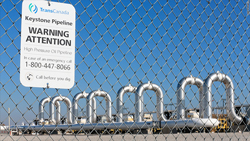The Keystone Pipeline leaked 210,000 gallons of crude oil in South Dakota on Nov. 16, creating the largest spill to date in the state. Despite this spill, proposals for pipelines across the U.S. continue to move through legislation, with energy companies acquiring permits for construction.
According to TransCanada, the company that owns the pipeline, the crude oil spill occurred three miles southeast of Amherst, South Dakota and transport of oil was shut down minutes after the leak was recognized. TransCanada reported that it would be days before any groundwater contamination could be discovered and that no immediate threat to human or wildlife was evident.
On Nov. 27, the company announced plans to repair and restart the pipeline.
Gloria Brown Simmons, three-time recipient of NASA’s Group Achievement Award in years 1990, ‘91, and ‘96, and adjunct professor of astronomy said that “this spill is disastrous. It is no surprise that, [despite risk assessments suggesting spills no more than 50 barrels no more than once every 7 to 11 years], there is yet another spill of harmful toxins into the environment.
However, there are currently similar pipeline projects proposed for the state of New Jersey, which have raised concern among experts and environmental groups.
One such project is the Pinelands Pipeline, which will run for 22 miles through the Pinelands Preservation and potentially carry natural gas through this land.
This project was previously declined by four consecutive NJ governors, and in 2014, declined by the Pinelands Commission itself.
Since the Pineland Commission’s original disapproval, two members of the committee who voted against the pipeline were replaced, and two new seats were given appointments by NJ Governor Chris Christie: Dennis Roohr , Mayor of New Hanover Township, and Robert Barr, President of the Ocean City Democratic Club.
Scott Jeffrey, Ph.D., associate professor of management and decision making sciences, refers to the behavior of Christie as a political phenomenon known as “court packing.”
“We have seen this in history with Franklin D. Roosevelt,” said Jeffrey, who is also a professor of ethics.
“When you don’t like the decision the group makes…change the group. This is the wrong thing to do. It controverts the philosophy of democracy, the independent judiciary, and the balance of power.”
According to Simmons, the NJ Sierra Club, an environmentalist group, is suing the Pinelands Commission over the approval of the pipeline.
“I’m in support of the efforts of the NJ Sierra Club and would appeal to the government elect to appeal this approval,” she said.
In addition to the Pinelands Pipeline, the PennEast could potentially be coming to NJ.
This pipeline would start from northeastern Pennsylvania and extend to Mercer County, NJ, with one third primarily in NJ, and would cost about $1 billion to construct.
Moreover, because it is an interstate pipeline, the project is under the jurisdiction of the Federal Energy Regulatory Commission (FERC) and must obtain state and local permits, in addition to the FERC Certificate of Public Convenience and Necessity.
If approved, the PennEast pipeline will cross environmentally sensitive areas and waterways such as the Delaware River and the Sourland Mountains.
Robin Kucharczyk, Ph.D., coordinator of General Education Natural Science and a Lecturer in the Department of Chemistry and Physics said, “Pennsylvanian fracking is done in Marcellus shale, which is a rock that holds natural gas deposits.”
“That’s where they would go to harvest the gas and it would have to go through New Jersey to go south, which would cross through the Delaware River,”Kucharczyk continued.
“This fracking is a problem because of the pollution it causes,” Kucharczyk explained.
“In order to get natural gas deposits from the rock, you have to force water and other hazardous chemicals into the shale to fracture it and release the gas. If these chemicals seep into the aquifer than this results in contaminated drinking water. If it reaches the surface, it affects the soil and the ecosystem,” she said.
While there is major controversy on both gas and oil pipeline constructions threats to the environment, President Donald Trump and other pipeline supporters often refer to the low manufacturing costs and potential for thousands of jobs.
In response to these arguments, Justin Murray, a senior student of finance, said, “The argument that pipeline construction leads thousands of jobs, is not false, but is not true. A majority of these jobs are temporary and do not result in employee retention.”
In response to these proposed benefits, Jeffery said, “First, I don’t believe manufacturers pass savings to consumers the way people think they do.”
Jeffrey explained that cheaper prices should not outweigh the adverse effects that could result from installing such a pipeline.
“Secondly, natural gas is still a fossil fuel. Even if something makes bad things cheaper, the price of the good is irrelevant because of its negative effect to society. If we use fossil fuels we should have to pay the full price and at this time; no one is paying for the potential damage caused by using fossil fuels,”Jeffrey concluded.
IMAGE TAKEN from CNN Money



